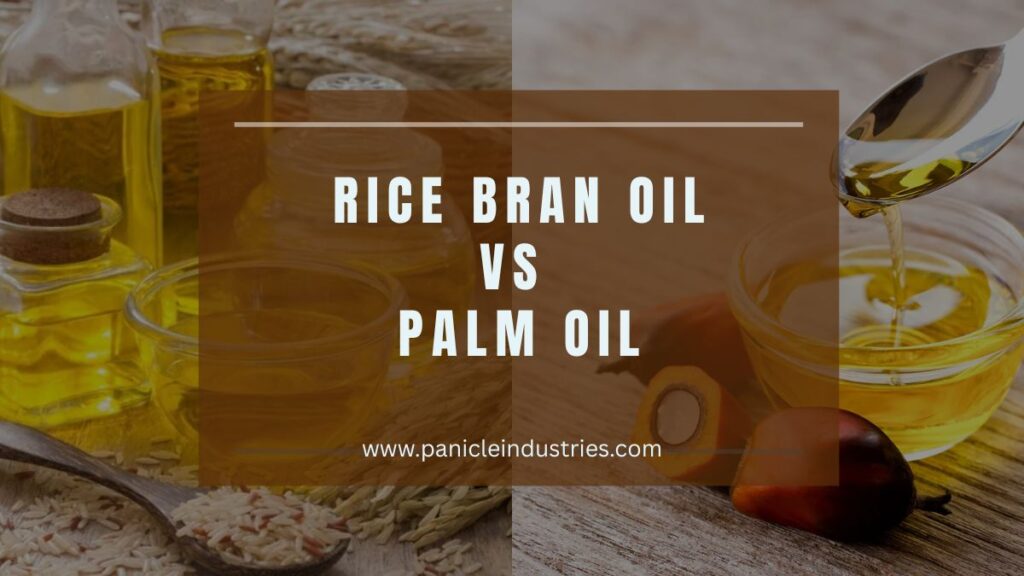Cooking oil is an essential part of every kitchen, and the choice of oil plays a big role in our health. Among many options available, two popular ones are rice bran oil and palm oil. People often wonder which one is healthier, tastier, and better for everyday use. Understanding the differences between the two is important because oils affect not only cooking but also long-term wellness.
In this blog, we will explore the topic “rice bran oil vs palm oil” in simple and clear terms. We will compare their nutrition, benefits, uses, and health impacts. By the end, you will have a clear idea about which oil is better suited for your cooking and overall lifestyle.
What Is Rice Bran Oil?
Rice bran oil is extracted from the outer layer of rice, called rice bran. This thin brown covering is usually removed when rice is processed, but it is rich in nutrients. Oil made from rice bran is widely used in Asian countries like Japan, India, and China. It has a light texture, mild flavor, and high smoke point, making it suitable for frying, sautéing, and deep cooking.
Nutritionally, rice bran oil contains:
- Unsaturated fats (healthy fats for the heart)
- Vitamin E (antioxidant)
- Oryzanol (a compound that lowers cholesterol)
- Small amounts of vitamin K
This oil is often recommended for people who want to maintain cholesterol levels and keep their heart healthy.
Also read: Rice Bran Oil vs Vegetable Oil
What Is Palm Oil?
Palm oil is extracted from the fruit of the oil palm tree. It is one of the most widely used oils in the world, especially in processed foods, snacks, and packaged items. Palm oil has a reddish-orange color before refining due to its natural carotene content.
Palm oil is rich in:
- Saturated fats (solid at room temperature)
- Vitamin E (tocotrienols and tocopherols)
- Beta-carotene (good for eye health)
It has a high smoke point and is stable for deep frying, which is why it is commonly used by the food industry. However, palm oil has been linked to certain health and environmental concerns.
Nutritional Comparison of Rice Bran Oil vs Palm Oil
Rice Bran Oil
- High in unsaturated fats (good fats)
- Contains gamma-oryzanol that reduces cholesterol
- Rich in antioxidants like Vitamin E
- Helps in controlling blood sugar and blood pressure
Palm Oil
- Higher in saturated fats (not as heart-friendly)
- Rich in Vitamin A (in red palm oil)
- Good source of Vitamin E
- Provides energy but may raise cholesterol if overused
Verdict: Rice bran oil is considered healthier for the heart compared to palm oil because of its lower saturated fat content.
Health Benefits of Rice Bran Oil
- Heart Health – Reduces bad cholesterol and increases good cholesterol.
- Weight Management – Light texture makes food less greasy, helping in calorie control.
- Rich in Antioxidants – Fights free radicals and slows down aging.
- Diabetes Control – Helps in controlling blood sugar levels.
- Better Digestion – Mild and easy to digest for most people.
Health Benefits of Palm Oil
- Rich in Vitamin A – Good for eye health (especially red palm oil).
- High Stability – Does not break down easily at high heat.
- Energy Boosting – Provides quick calories.
- Supports Brain Function – Contains tocotrienols that may protect brain cells.
- Affordable and Accessible – Widely available and cheaper than other oils.
Health Concerns of Rice Bran Oil
While rice bran oil is generally safe, overconsumption may lead to:
- Excess calorie intake
- Mild stomach upset in sensitive individuals
- Reduced absorption of some minerals if consumed in very high amounts
Health Concerns of Palm Oil
Palm oil has more debated health concerns:
- High in saturated fats, which may increase cholesterol and risk of heart disease.
- Overuse in processed foods can contribute to obesity.
- Refined palm oil loses some nutrients during processing.
Verdict: Palm oil should be consumed in moderation, especially for people with heart issues.
Cooking with Rice Bran Oil vs Palm Oil
- Rice Bran Oil: Best for stir-frying, sautéing, baking, and deep frying due to its high smoke point. It does not change the taste of food much.
- Palm Oil: Commonly used in packaged snacks, fried foods, and processed products. In home cooking, it is less common unless used in traditional recipes.
Environmental Impact: Rice Bran Oil vs Palm Oil
Apart from health, there is also an environmental side:
- Rice Bran Oil: Made from a by-product of rice milling, so it is sustainable and eco-friendly.
- Palm Oil: Palm oil plantations often lead to deforestation, harming wildlife and the environment.
Verdict: Rice bran oil is more environmentally friendly compared to palm oil.
Which Oil Is Better for Heart Health?
- Rice Bran Oil: Better choice for heart health due to unsaturated fats and cholesterol-lowering properties.
- Palm Oil: Higher in saturated fats, which may not be the best for people with high cholesterol or heart disease.
Price and Availability
- Rice Bran Oil: Slightly more expensive, but easily available in supermarkets and health stores.
- Palm Oil: Cheaper and more widely available, especially in packaged foods and restaurants.
Who Should Use Rice Bran Oil?
- People with high cholesterol
- Individuals with diabetes
- Those who want to maintain heart health
- Health-conscious families
Who Should Use Palm Oil?
- People with no heart issues who want affordable oil
- Athletes or individuals needing quick energy
- Traditional recipes that specifically use palm oil
Expert Recommendations
Most nutritionists recommend rice bran oil over palm oil for regular cooking because of its heart-friendly benefits. Palm oil can be used occasionally but should not be the main cooking oil, especially for people with lifestyle diseases.
Conclusion
When comparing rice bran oil vs palm oil, the healthier choice depends on your needs and lifestyle. Rice bran oil is lighter, heart-friendly, and rich in antioxidants, making it a better option for everyday cooking. Palm oil, on the other hand, provides quick energy and is affordable, but its higher saturated fat content makes it less suitable for long-term health. From an environmental view, rice bran oil is more sustainable, while palm oil production raises concerns. For a balanced diet, using rice bran oil regularly and limiting palm oil consumption is the best approach. Making the right choice ensures both health and wellness for you and your family.


